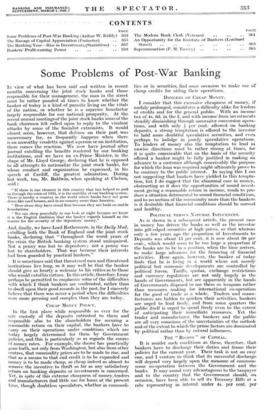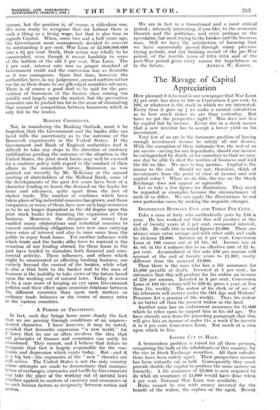Some Problems of Post-War Banking
IN view of what has been said and written in recent months concerning the joint stock banks and those responsible for their management, the man in the street must be rather . puzzled at times to know whether the banker of today is a kind of parasite living on the vitals of the nation, or whether he is a supreme benefactor largely responsible for our national. prosperity. At the recent annual meetings of the joint stock banks some of the bank chairmen felt called upon to reply to the virulent attacks by some of the Socialist extremists. It would almost seem, however, that defence on their part was unnecessary for, as frequently happens when there is an unworthy vendetta against a person or an institution, there comes the reaction. We now have journal after journal extolling the benefits rendered by our banking institutions, and we have an ex-Prime Minister, in the shape of Mr. Lloyd George, declaring that he is opposed to all attempts to nationalize the joint stock banks, for whose conduct and organization- he expressed, in his speech at Cardiff, the greatest admiration. During last week, too, Mr. Baldwin, when speaking at Chelsea, said :
" If there is one element in this country that has helped to pull us through the crisis of 1931, it is the stability of our banking system. There is hardly a country in the world where banks have not gone down like card houses, and iri no country more than America.
" Here alone they have stood firm because they are built on stable foundations.
" We can sleep peacefully in our beds at night because we know it is the English tradition that the banker regards himself as the trustee for the security of the depositors' money." . _
And, finally, we have Lord Rothermere, in the Daily Mail, extolling both the Bank of England and the joint stock banks, declaring that " throughout the worst years of the crisis the British banking system stood unimpaired. Not a penny was lost to depositors ; not a penny was lost to shareholders. That was because their interests had been guarded by practical bankers."
It is sometimes said that threatened men and threatened institutions live long, so it may well be that the banker should give as hearty a welcome to his critics as to those who would extol his virtues. In this article, therefore, I may perhaps be permitted to emphasize some of the difficulties with which I think bankers are confronted, rather than; to dwell upon their good records in the past; for I sincerely: believe that there was never a period when the difficulties were more pressing and complex than they are today.
CHEAP MONEY POLICY.
In the first place _while responsible as ever for the safe custody of the deposits entrusted to them and responsible also to the shareholders for securing a reasonable return on their capital, the bankers have to carry on their operations under conditions which are today largely determined for them by Government policies, and this is particularly so as regards the course of money rates. For example, the decree has practically gone forth, not only from Washington, but also from other centres, that commodity prices are to be made to rise, and that as a means to that end credit is to be expanded and money is to be made" cheap, so cheap indeed as almost to remove the incentive to thrift so far as any satisfactory return on banking .deposits or investments is concerned. Yet, in spite of this extreme cheapness of money, traders and manufichirers find little use for loins at the present . time, though doubtless speculators, whether in commodi- . ties or in securities, find some occasion to make use of cheap credits for aiding their operations...
DANGERS OF CHEAP MONEY.
I consider that this excessive cheapness of money, if unduly prolnnged, constitutes a difficulty alike for lenders of credits and for the general public. With an income tax of 4s. 6d. in the and with income from investments steadily diminishing through successive conversion opera- tions, and with only 4- per cent. allowed on banking deposits, a strong temptation is offered to the investor to hold more doubtful speculative securities, and even perhaps to indulge in purely speculative operations. To lenders of money also the temptation to lend in unwise directions must be rather strong at times, for it is quite conceivable that on the basis of the security offered a banker might be fully justified in making an advance to a customer although conceivably the purpose for which the. loan was required might ultimately prove to be contrary to the public interest. In saying this I ant not suggesting that bankers have yielded to this tempta- tion, but I do suggest that the abnormal ease in money, obstructing as it does the opportunities of sound invest- ment giving a reasonable return in income, tends to pro- duce a situation detrimental to sound financial conditions, and to no section of the community more than.the banker.: is it desirable that financial conditions should be normal and healthy.
POLITICAL VERSUS NATURAL INFLUENCES.
As is shown in a subsequent article, the present ease in money has driven the banks as well as the investor into gilt-edged securities at high prices, so that whereas only a few years ago the proportion of Investments to Deposits was about 15 per cent. it is now about 30 per cent., which would seem to be too large a proportion if the banks are to be in a position, when the time arrives, to make large advances for the financing of financial activities. Ilere again, however, the banker of today finds that he is living in a world where not merely political but economic developments are controlled by political forces. Tariffs, quotas, exchange restrictions and currencT regulations are not only largely in . the hands of Governments, but are apparently in the hands of Governments disposed to use them as weapons rather than measures making for international co-operation for the good of trade as a whole. Traders and manu- facturers are bidden to quicken their activities, bankers are urged to lend freely, and from some quarters the public itself is urged to spend freely even to the extent of anticipating their immediate resources. Yet the trader and manufacturer, the bankers and the public are all very conscious of the uncertainties of the outlook and of the extent to which the prime factors are dominated by political rather than by natural influences.
Tni " RIGHTS " OF CAPITAL.
It is amidst such conditions as these, therefore, that bankers have to discharge their duties and frame their policies for the current -year. - Their task is not an easy one, and I venture to think that its successful discharge will depend very largely upon the measure of common- sense co-operation between the Government and the banks. It may sound very advantageous to the taxpayer and to the country that the Government should, on occasion, have been able to sell its Treasury Bills at a rite representing in interest under 4s. per cent. per annum, but the position is, of course, a ridiculous one. We seem ready to recognize that for Labour there is such a thing as a living wage, but that is also true as regards Capital. When, some two and_ a half years ago, the Government most courageously decided to convert its outstanding_ 5 per cent: War Loan of £2,000,000,000 into a 8i per cent. Stoisk, their action was wholly to be conunended, even though it meant hardship to some of the holders of the old 5 per cent. War Loan. The 5 per cent. interest rate was no proper standard of Government credit and the conversion was as desirable as it was courageous. Since that time, however, the authorities have, in my judgement, pressed matters rather • too far in their desire to see gilt-edged securities advance. There is of course a good deal to be said for the pre- vention of borrowers of the trustee class coming too quickly and largely upon the market, but the preventive measures can be pushed too far in the sense of eliminating that amount of competition between borrowers which is only fair to the lender.
MODERN CONDITIONS.
Nor, in considering the Banking Outlook, must it be forgotten, that the Government and the banks alike are faced with the uncertainty as to the outcome of the Roosevelt experiments in the United States. If the Government and Bank of England authorities find it difficult to take any steps in the direction of currency stabilization pending the outcome of the situation in the United States, the joint stock banks may well be excused for a cautious policy with regard to the conduct of their affairs in the immediate future. Moreover, as was pointed out recently 'by Mr. McKenna at the annual meeting of shareholders of the Midland Bank, some of the developments of the past few years have been of a character tending to lessen the demand on the banks for loans and advances, quite apart from the fact of slacker trade. The number of combines which have taken-place of big industrial concerns-has grown, and those companies, or many of them, have now such large resources as to be no longer dependent in the old degree upon the joint stock banks for financing the expansion of their business. Moreover, the cheapness of money has enabled many ctkriorations and industrial concerns to convert outstanding obligations into new ones carrying lower rates • of interest and- also to raise sums _ from the public to repay bank loans. Yet another influence with which trade and the banks. alike have to contend is the cessation of our lending abroad, for these loans in the past have tended to stimulate both financial and coin: mercial activity, These influences, and others' which might be enumerated as affecting banking business, are entirely beyond the control of the banker, while what is also a trial both to the banker and to the man of business is the inability to take views of the future based upon the working out of natural laws.-- Today it seems to be a case more of keeping an eye upon Government policies and their effect upon economic relations-between the different countries than upon such matters . as ordinary trade balances or the course of money rates in the Various countries.
A' PERIOD OF TRANSITION.
In fact, each day bringshoine more clearly the fact that we are passing through conditions of an unprece- dented character. I have however, it may be noted, avoided that favourite expression " a new world," for, I fancy that its use so often involves the idea that old principles of finance and economics can safely be abandoned. They cannot, and I believe that failure to recognize that fact is largely responsible for the con- fusion ,and depression which, exists today. . But—and it is a big but—the exponenti of the new " theories are still active. The United States is not the only country where attempts are made to demonstrate that manipu lation of exchanges, currencies and tariffs by Governments 11 take the place of the working out of natural laws whether applied to matters of currency and economics or. to such human factors as reciprocity between nation and nation. i We are in fact in a transitional and a most critical period.; . intensely interesting, if you like, to the economic theorist• and the politician, and even perhaps to the speculator, bat most trying to the banker and the business man. Still we have ,the satisfaction of knowing that we have successfully passed through many previous trying periods, and our banking record of the pre-War period, of the terrible years- of 1914-1918 and of the post-War periodzives every reason for hopefulness as



























































 Previous page
Previous page